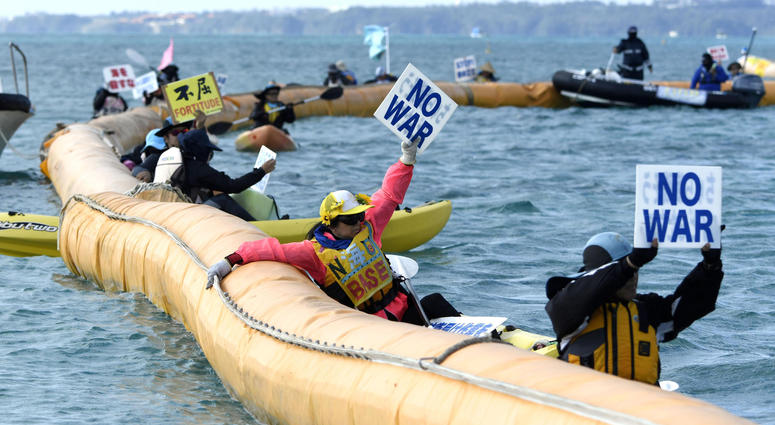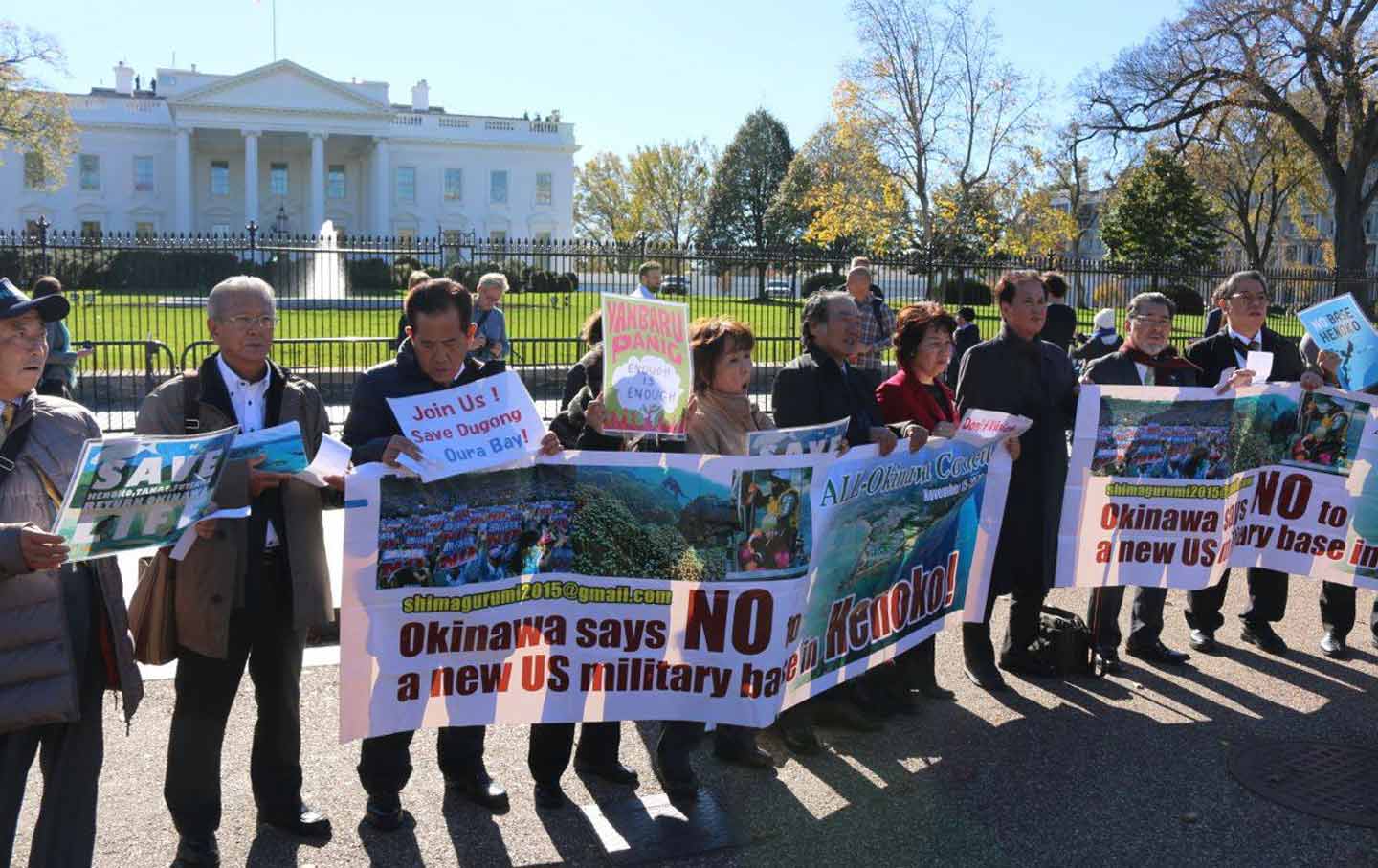
By Valerie Cha
“Okinawans will not give up! Okinawans will not give up!” These are the voices of Okinawan locals who are actively protesting an American-Japanese political project: the relocation of the U.S. Marine Corps Air Station Futenma. Tim Shorrock, an author focused on US military policies in Asia, states that the project began in 1995 when three U.S. Marines kidnapped and raped an Okinawan schoolgirl. Since the incident, Okinawans have been protesting and demanding that the base be closed.

To resolve the issue, the American and Japanese government decided that Futenma Air Base should relocate to Henoko Bay. According to Yuri Kageyama, a Marine Corps Times author, the idea is it to remove the large American base located in a heavily populated area to a less dense region. Henoko would house less military personnel and place some American troops off the island in nearby countries. Although the plan removes Futenma Air Base away from a greater population, Okinawans are fighting to remove the base entirely off the island in fear that the relocation will destroy Henoko’s environment. They also fear that the U.S. Military will carry over their dangerous behaviors to the new region.
As an American who first stepped foot on the island last summer, I unknowingly contributed to the increase in a population that some locals wish to reduce. The protesting of the base caught me by surprise and encouraged me to unravel the relocation controversy. Let’s begin by weighing the options.
As mentioned, both governments hoped that by relocating the American base from a crowded region to a less populated area, it would potentially affect less people. However, Okinawans believe that harm done, is still harm done. In reference to Kageyama, locals argue that “military have been described as noisy and dangerous since they arrived on the island and continued their development in 1945.” Similarly, Futenma has been long criticized as noisy and dangerous. I can see why Okinawans question the difference in behavior if the base was relocated rather than dismissed altogether. This poses the question of whether Henoko’s smaller population matters if Americans give rise to the issues.

Of course it is not the only reason why men and women of all ages continue marching and chanting along the gates of Futenma. Relocating the base to Henoko meant “filling in Oura Bay with earth, sand, cement, gravel, and large rocks” (Shorrock, 2018). In 2018, the Marine Corps Times’ Associated Press wrote an online article that addressed concerns about the endangered marine mammal in the area: the Okinawa dugong. The Okinawa dugong is a manatee-like animal that signifies the “traditional creation myths” of Japan. The article states that critical feeding grounds and habitat for the dugong are in danger if the plan continues. In addition, Okinawan Prefectural Government says, “over 5,800 species of creatures, including 262 endangered species, are confirmed to exist in the waters of Henoko and Oura Bay.” Marine wildlife is a significant part of the island and lifestyle of its residence. Harming it is equivalent to harming locals and interfering with their way of living.
Another perspective opposing the relocation project focuses on cost and duration. Annmaria M. Shimabuku, the author of a new book on Okinawa, mentions that the latest study by the Okinawa Prefectural Government on Henoko indicated that the total cost of tearing down Futenma and constructing a new base in Henoko could exceed $22.5 billion, which is 10 times the original estimated cost. The plans for relocating Futenma dates back over five decades with local oppositions hindering efforts to actually begin construction. To me, it seems as though all parties have consumed a great amount of time and money arguing over a plan that has not yet been acted upon. This proves that the controversy over the project is extremely valuable and worth analyzing. The question left to ask is, despite protestors opinions, what are possible benefits that encourages both governments and some locals to fight in favor of the new construction?

On the report of “The U.S. Military Presence in Okinawa and Futenma Base Controversy,” Emma Chanlett-Avery, a specialist in Asian Affairs, and Ian E. Rinehart, an analyst in Asian Affairs, mention that both governments agreed a handful of the 9,000 marines (and their dependents) would relocate from Okinawa to surrounding locations such as Guam, Australia and Hawaii. By doing so, it reduces the amount of military presence on the island and addresses the concerns of locals. Although it is a start to put forth some effort in hearing out protestors, is relocating a small portion from the thousands that colonize the island enough?
In efforts to continue the plan, the U.S. and Japanese governments believe that the new base is placed in a strategic location for political reasons. Chanlett-Avery and Rinehart says that in the event of defending and/or retaking uninhabited islands from a hypothetical invasion force, the operational capabilities of the Okinawa-based Marines are needed. This leads us to believe that American presence on the island is beneficial in preparation for possible disputes.
Although many locals oppose the plan, I found perspectives of some who are in favor of the new construction. In the PBS Newshour report, “On Okinawa, many locals want U.S. troops to leave”, Amy Guttman states that Japan contributes about $1.7 billion a year to the cost of U.S. deployment, in addition to providing Okinawa funds for hosting a portion of American troops. She continues to say that the troops provide economic security by increasing jobs for Okinawans and supporting local businesses. Likewise, Steve Rabson, from the Institute for Policy Studies, writes that the poor village’s desire for a modern, urban life with electricity and sanitary water would be provided by the new base. Some locals in Henoko are in favor of the plan as it opens economic possibilities in the area.
The disagreement between Okinawa, the U.S. and Japan over the relocation of Futenma Air Base is an ongoing dispute as locals are still fighting to push the base completely off the island. After analyzing the issue based on positive and negative perspectives, we can suggest that there is much more effort needed for a resolution that would benefit Okinawa and the U.S.-Japanese alliance. Although many Okinawans argue that the presence of so many U.S. troops is burdensome already and they would rather have the base entirely off than relocating the problem to a different region, the dispute continues and the project remains as is until all governments come to a compromise.
One thought on “Futenma to Henoko: The Dispute Between Okinawa and the U.S.-Japanese Alliance”